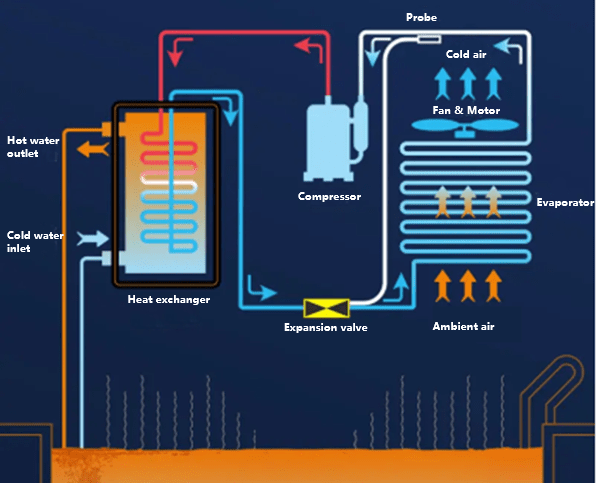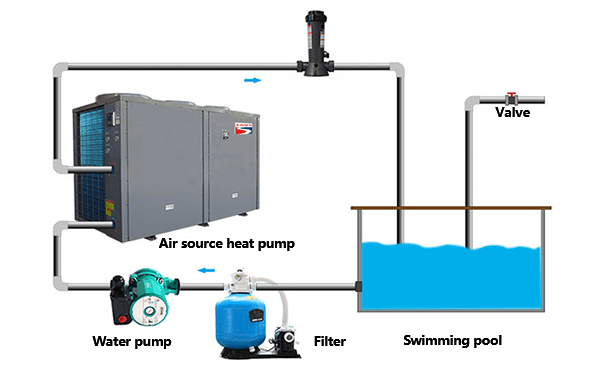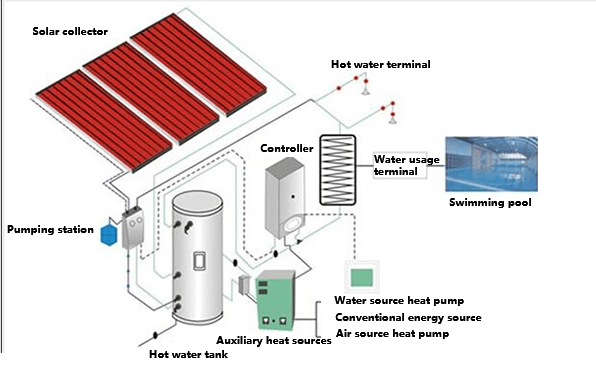
Figure 1: Swimming pool heat pump.
If you own a swimming pool, you know that keeping the water at a comfortable temperature is essential for an enjoyable swimming experience. One popular method of heating a pool is through the use of a pool heater.
But how does a pool heater work, and what are the different types of pool heaters available? In this article, we will explore the working principles of 4 types of pool heaters and factors to consider when choosing a pool heater.
There are four main types of pool heaters: gas, electric, solar, and heat pump types. Let's explore each type in more detail.
1. Gas Pool Heaters
1.1 How Does a Gas Pool Heater Work?
Gas pool heaters are one of the most common types of pool heaters. Gas heaters work by burning either natural gas or propane to generate heat. The heat generated by the combustion is then transferred to the pool water through a heat exchanger.

Figure 2: Gas pool heater diagram.
Here's a step-by-step breakdown of how gas heaters work:
● Step 1: Gas is burned in the combustion chamber, creating hot exhaust gases.
● Step 2: The exhaust gases pass through the heat exchanger, which transfers the heat to the pool water.
● Step 3: The heated water is then returned to the pool, and the process repeats.
Gas heaters are powerful and can quickly heat large volumes of water, making them ideal for use in colder climates. However, they are not as energy-efficient as other types of pool heaters and can be expensive to operate.
2. Electric Pool Heaters
2.1 How Does a Electric Heater Work?
Electric heaters work by passing the pool water through a heating element that is powered by electricity.

Figure 3: Electric pool heater.
Here's a step-by-step breakdown of how electric heaters work:
● Step 1: Water is pumped from the pool and passed through the heating element.
● Step 2: The heating element heats the water as it flows through.
● Step 3: The heated water is then returned to the pool.
Electric heaters are easy to use and require little maintenance. However, they can be expensive to operate, especially if you have a large pool.
3. Pool Heat Pumps
3.1 How Does a Pool Heat Pump Work?
Heat pumps are another type of pool heater that uses electricity to heat the water. However, they work differently than electric heaters. Heat pumps work differently than gas and electric heaters. Instead of generating heat directly, they extract heat from the air or ground and transfer it to the pool water.

Figure 4: Pool heat pump working principle diagram.
Here's a step-by-step breakdown of how heat pumps work:
● Step 1: A fan pulls in warm air from the outside and passes it over an evaporator coil filled with refrigerant.
● Step 2: The warm air causes the refrigerant to evaporate, absorbing heat from the air.
● Step 3: The warm refrigerant gas then passes through a compressor, which increases its temperature.
● Step 4: The hot refrigerant gas then passes through a condenser coil, where it transfers its heat to the pool water.
● Step 5: The now-cooled refrigerant gas passes through an expansion valve, which lowers its pressure and temperature, and the process repeats.
Heat pumps are more energy-efficient than gas and electric heaters and can save you money on your energy bills. However, they require a higher upfront cost and may not be as effective in colder climates.

Figure 5: Installation diagram of pool heat pump system.
4. Solar Pool Heaters
How Does a Solar Pool Heater Work?
Solar pool heaters use the sun's energy to heat the water. They work by circulating the water through a series of panels that are mounted on the roof or on the ground near the pool. The panels absorb the sun's energy, which is then transferred to the water before it is returned to the pool.
One of the main benefits of solar pool heaters is that they are very energy efficient and can be inexpensive to operate. However, solar heaters may not be as effective in areas with limited sunlight or during periods of cloudy weather.

Figure 6: A swimming pool with a solar pool heater.
In summary, regardless of the type of pool heater you choose, they all work using the same basic principles. Let's take a closer look at how pool heaters work.
● Pool heaters use heat exchangers to transfer heat from one source to another.
● Pool heaters use thermostats to regulate the temperature of the water. A thermostat is a device that measures the temperature of the water and signals the heater to turn on or off as needed. This helps maintain a consistent water temperature in the pool.
● Pool heaters rely on pumps to circulate the water through the system. The pump pulls water from the pool and pushes it through the heater, where it is heated before being returned to the pool.
5. Factors to Consider when Choosing a Pool Heater
When choosing a pool heater, several factors should be considered, including:
5.1 Size
The size of the pool is an essential factor to consider when choosing a pool heater. The larger the pool, the more powerful the heater needs to be to keep the water at the desired temperature. When selecting a pool heater, you should ensure that it can handle the volume of water in your pool.
5.2 Climate
The climate of your location is also an important factor to consider. If you live in a warmer climate, you may not need a powerful heater to keep your pool at a comfortable temperature. However, if you live in a colder climate, you may need a more powerful heater to maintain a consistent temperature.
5.3 Energy Efficiency
Energy efficiency is an essential factor to consider when choosing a pool heater. Gas heaters are generally less efficient than electric, heat pump, or solar heaters. Electric heaters are more expensive to operate than gas heaters.
Heat pumps are very energy-efficient and can save you money on your energy bills. Solar heaters are the most energy-efficient and cost-effective option in the long run, but may not be suitable for all locations.

Figure 7: Solar pool heater with auxiliary heating system.
5.4 Cost
The cost of the heater is also an important factor to consider. Gas heaters are usually the most affordable option upfront, but they can be costly to operate. Electric heaters are more expensive to buy but may be cheaper to operate in the long run.
Heat pumps are more expensive upfront but can save you money on your energy bills over time. Solar heaters have a higher upfront cost but have lower operating costs over time.
5.5 Maintenance
Different types of pool heaters require different levels of maintenance. Gas heaters require regular maintenance to ensure that they are operating efficiently and safely. Electric heaters are generally low-maintenance, but they may require periodic cleaning of the heating elements.
Heat pumps require regular maintenance to ensure that the refrigerant levels are correct and that the unit is operating efficiently. Solar heaters require minimal maintenance but may require occasional cleaning of the collectors.
5.6 Environmental Impact
The environmental impact of the pool heater is another factor to consider. Gas heaters produce greenhouse gas emissions, which can contribute to climate change. Electric heaters and heat pumps are more environmentally friendly options, but they still rely on electricity, which may be generated from non-renewable sources.
Solar heaters are the most environmentally friendly option, as they rely on renewable energy from the sun.

Figure 8: Swimming pool.
5.7 Noise Level
The noise level of the pool heater is also a factor to consider. Gas heaters can be noisy when they are operating, which may be a concern if your pool is located near a residential area. Electric heaters and heat pumps are generally quieter than gas heaters. Solar heaters are completely silent.
6. What is the Best Heater for a Swimming Pool?
The best heater for a swimming pool will depend on your specific needs and circumstances. If energy efficiency and low long-term operating costs are a priority, a pool heat pump or solar pool heater may be the best option. If you need to heat your pool quickly and efficiently, a gas pool heater may be the best choice. An electric pool heater is a good choice for smaller pools or spas that require less heat.
7. FAQs
7.1 What is a Pool Heat Pump?
A pool heat pump is a type of device that uses electricity to transfer heat from the surrounding air or water to warm up a swimming pool.

Figure 9: Pool heat pump structure.
7.2 What Size Heat Pump for Pool?
The size of the heat pump for a pool will depend on the size of the pool, the desired temperature, and the climate in which the pool is located.
A general rule of thumb is to choose a heat pump that is sized to provide 100% of the heat needed for the pool under the worst-case conditions, such as during the coldest part of the year.
A qualified pool professional can help determine the appropriate size of the heat pump for a specific pool. It's important to choose the right size heat pump to ensure that it operates efficiently and effectively and to avoid unnecessary energy costs.
7.3 How Long to Heat Pool with Heat Pump?
The time it takes to heat a pool with a heat pump will depend on various factors, such as the size of the pool, the desired temperature, and the ambient air temperature.
Typically, a heat pump can raise the temperature of a pool by 1-2°F per hour, but this can vary depending on the conditions. Therefore, it may take several hours or even days to heat a pool to the desired temperature.
Related Info
Solar Assisted Heat Pump: Definition, Working Principle and BenefitsSwimming Pool Heat Pump: Definition, Working Principle and Benefits
What are the Pros and Cons of Heat Pumps
Pros and Cons of Heat Pump vs Gas Furnace: Which is Better for Your Home?
Heat Pump: Everything You Need to Know (9 Diagrams Help Better Understand Heat Pumps)


